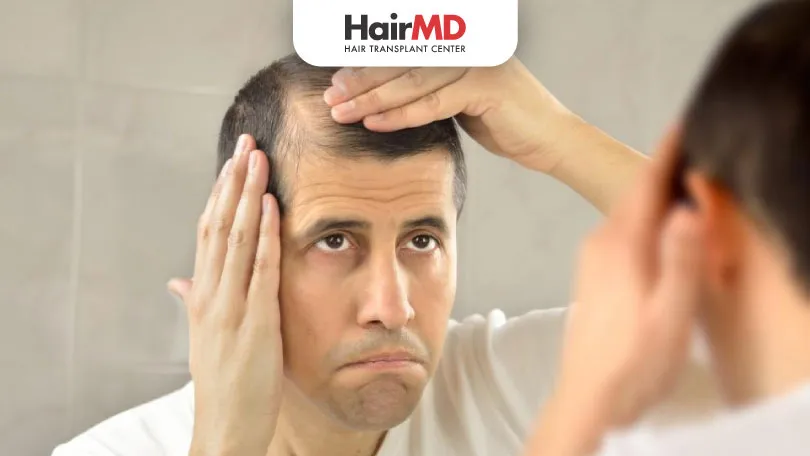20th April, 2024

Lupus Erythematosus is an autoimmune disease that results in joint pain, stiffness, and a butterfly-shaped rash on the face. But in some cases, lupus can also lead to hair loss. If you’ve been suffering from the latter, here are some insights on lupus hair loss and its treatment.
Lupus, an autoimmune disease, can lead to hair loss due to its impact on the skin and scalp. Understanding how lupus affects your hair is essential to managing this condition effectively. In this blog, we explore the causes of lupus-related hair loss, its symptoms, and the most effective treatment and prevention methods. With early diagnosis and the right care, it’s possible to mitigate hair loss and improve scalp health. If you’re experiencing hair loss due to lupus, read on for essential advice.
What’s covered in the article?
- What is Lupus Hair Loss?
- What Type of Lupus Causes Hair Loss?
- Lupus Hair Loss Symptoms
- How Do You Stop Hair Loss from Lupus?
- Early Identification and Treatment
- Conclusion
What is Lupus Hair Loss?
Lupus is a long-term autoimmune disease that makes the person’s immune system attacks healthy body cells. Some common problems with lupus include damage to the lungs, kidney, skin and joint. Skin involvement is common in the form of rash and burning sensation on sun exposed areas such as face, neck and arms. Along with skin, active cases may experience severe hair fall, short broken hairs on the scalp.
What Type of Lupus Causes Hair Loss?
Cutaneous lupus erythematosus is a lupus type that affects the skin. People suffering from cutaneous lupus erythematosus can suffer from problems like skin sensitivity to the sun and rashes. Hair loss is a common symptom associated with this lupus type and in severe systemic disease.
Lupus Hair Loss Symptoms
When lupus attacks hair, it can increase the rate of hair loss. While it is normal to shed about a hundred hairs a day, lupus can accelerate the pace and increase the number of lost hairs. People losing hair due to lupus experience increased hair fall while brushing or washing it.
Lupus hair loss patterns may vary from person to person. In some cases, people may suffer only from breakage around the hairline or experience minor thinning. On the other hand, in severe cases, the patients may lose clumps of hair. One may lose hair throughout the scalp, while in some, it could remain confined to a particular section of the head. Now, let’s see how to treat lupus hair loss.
How Do You Stop Hair Loss from Lupus?
So, here’s how to treat hair loss from lupus.
Healthy Diet :
While suffering from lupus, your body requires sufficient nutrition to deal with it. For hair, foodstuffs that contain proteins, biotin, vitamins C and D, and minerals like zinc and iron should be included in the diet.
Sunlight Protection :
Lupus makes your body sensitive to the sun, making the scalp even itchier and worsening the rashes. Thus, you must cover your head and face when you step out in the sun.
Stress Control :
Stress can aggravate existing condition. Thus, it would help to control stress levels via a healthy diet, regular exercise, and indulging in healthy hobbies that soothe and relax your mind.
Get Adequate Rest :
While consuming medications or supplements for lupus hair loss or following a specific treatment, one must ensure that their body gets enough rest. About seven to eight hours of sleep in the night can prove adequate to combat stress.
Early Identification and Treatment
Early identification and treatment is the most important factor in controlling lupus erythematosus. Skin rash in sun exposed areas such as face and neck, aggravated hair fall and hair thinning, difficulty in breathing, swelling over face and legs, joint pain, pallor are few symptoms which point towards lupus erythematosus. Consult a dermatologist or rheumatologist in case of these symptoms and start treatment.
Are you seeking more information or case-specific consultation and treatment on male or female lupus hair loss? Visit HairMD. We are one of the leading hair clinics in Pune with experience treating lakhs of patients. We’ve treated several cases of lupus. Our results are evident from before and after pictures of lupus hair loss.
Do You Know?
Nearly 250 Patients Visit HairMD
Everyday For Various Hair Concerns?
(Your journey to healthier and fuller hair starts here!)
Meet Our Dermatologists
Conclusion
In conclusion, lupus-related hair loss can be distressing, but with early diagnosis and proper treatment, it can be managed effectively. A combination of a healthy diet, sun protection, stress control, and rest plays a crucial role in mitigating hair loss. Consulting with a dermatologist or rheumatologist for personalized care is essential for long-term management. If you or a loved one are dealing with lupus-induced hair loss, seeking professional advice early on is the key to maintaining healthy hair and overall well-being.
Further Reading
Top Kitchen Ingredients to Boost Hair Growth
Discover the best kitchen ingredients for hair growth! Use coconut oil, onion juice, aloe vera & more to nourish your hair naturally and reduce hair fall.
How to use Minoxidil and Dermaroller together?
Boost hair growth with Minoxidil & Dermaroller! Learn the right technique, benefits, and mistakes to avoid for thicker, healthier hair.
Powerful Home Remedies for Itchy Scalp
Soothe an itchy scalp naturally with home remedies like aloe vera, coconut oil, and apple cider vinegar. Discover simple solutions for scalp relief.
Omega-3 for Hair Growth: Benefits and Side Effects
Omega-3 nourishes hair, promotes growth, and reduces hair fall. Know its benefits, side effects, and best sources for healthy, stronger hair.
Have thoughts? Please let us know
We are committed not only to treating you, but also educating you.











